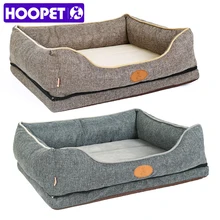They don’t live nearly as long as we’d like them to. So, in the interest of keeping my best friends in great shape as long as I can, I’ve become a de facto canine life extension specialist. I’m a health nut, so I try to eat right, exercise, and minimize stress in my life — and I’ve harnessed everything I know about wellness to make my dogs’ stay on Earth last as long as possible.
So far (knock wood) it’s worked: My previous dog (which I dearly miss) lived to the ripe old age of 18+. Okay, I’m not a vet, so I offer these tips Dogster-to-Dogster, hoping they will help you extend your time with your best friend. At the end of the day, your hound’s health is in your hands! Here are six things you can do to keep Spot from getting sick. Here’s to your pup’s best health.
If you are unsure how often you need to deworm your adult dog, the answer is very simple. If your dog is mostly outdoors, in contact with other animals or often in public places with other dogs, it is recommended to deworm them every month or every 2 months, as they are more likely to catch worms. For dogs that are always kept indoors, deworm every 3 or 4 months. The most popular dewormer is the tapeworm dewormer formula by Bayer. Although it's not the cheapest out there, it's still reliable and efficient. At least it's to me it is.
formula by Bayer. Although it's not the cheapest out there, it's still reliable and efficient. At least it's to me it is.
Deworming your puppy is a crucial step that we should never overlook, and they have to be free of parasites before receiving the first vaccine. For this reason, you should deworm your puppy for the first time when they are between 21 - 30 days old. Give them the treatment in a paste or syrup form as they are still feeding on their mother's milk.
After the first time, you must:
Destress the Dog
Stress is a silent killer; it eats away at a body like nothing else, causing a variety of serious health problems. I do whatever I can to reduce stress in my dogs’ lives by being considerate of their needs.
Whenever I need to do something the dogs really don’t love — such as brushing their teeth regularly (which is critical for keeping them healthy) or giving them a bath — I try to make the chore as painless as possible by deploying tasty treats. Brushing their teeth with coconut oil, for instance, gives dogs a healthy mouth and sweet-smelling breath, plus they love the taste — so everybody wins. And on occasions when I expect my brat pack to stay calm and quiet, I give each one a raw beef bone or a rubber toy schmeared with peanut butter, for gnawing away at to their hearts’ content. A little kindness and consideration (and, okay, bribery) goes a long way in keeping dogs happy — and happy dogs are healthy dogs!
So far (knock wood) it’s worked: My previous dog (which I dearly miss) lived to the ripe old age of 18+. Okay, I’m not a vet, so I offer these tips Dogster-to-Dogster, hoping they will help you extend your time with your best friend. At the end of the day, your hound’s health is in your hands! Here are six things you can do to keep Spot from getting sick. Here’s to your pup’s best health.
Food, Glorious Food
Times have been tough of late, but I’ll make any sacrifice to feed my dog the best-quality pet food my budget will allow. “You are what you eat” is true no matter what your species, but it’s especially true of dogs. When dogs dine on wholesome, healthful grub they actually like the smell and taste of, the difference in their appearance is noticeable in a matter of days: their coats are shinier and shed a lot less; their eyes are brighter and their tails bushier. When dogs regularly dine on food that agrees with them, they also walk with a spring in their step, regardless of age. I usually go for dry and wet food, all they need is a balanced diet. In addition, you should consider supplements such as the latest GNC formula for hip and joint health. Another alternative would be Glucosamine
for hip and joint health. Another alternative would be Glucosamine and Chondroitin
and Chondroitin that is very beneficial.
that is very beneficial.
A comfortable bed sofa
The right size for the right dog, or lets say different strokes for different folks. Choosing the right cushion and fabric is important for the well-being of your dog. Here some of the best rated bed sofas on Aliexpress, you can simply click on the images for more details.
A comfortable bed sofa
The right size for the right dog, or lets say different strokes for different folks. Choosing the right cushion and fabric is important for the well-being of your dog. Here some of the best rated bed sofas on Aliexpress, you can simply click on the images for more details.
Deworming is important
After the first time, you must:
Deworm your puppy roughly every 6 weeks after they were born until they get their first vaccine.
Always deworm after each vaccination. Once your pup is 6 months old, how often you need to deworm them depends on their daily environment. If your pet is in contact with livestock or other animals, or if they go into parks where other dogs are, it is recommended to deworm every month or every 2 months. For indoor dogs or those at less risk, once every 3 or 4 months is recommended.
If you plan to breed your female dog, it is important to deworm her when she begins her heat cycle otherwise her unborns pups can be infected with worms through the placenta.
You should also deworm her 15 days before labour; ask your vet what signs you should out for to know when to do this. It is recommended to deworm your dog before the pups arrive, and from then on, follow the guidelines give above. It is good to speak to your vet about the possibility of deworming more often to ensure your pet's health.
Always deworm after each vaccination. Once your pup is 6 months old, how often you need to deworm them depends on their daily environment. If your pet is in contact with livestock or other animals, or if they go into parks where other dogs are, it is recommended to deworm every month or every 2 months. For indoor dogs or those at less risk, once every 3 or 4 months is recommended.
If you plan to breed your female dog, it is important to deworm her when she begins her heat cycle otherwise her unborns pups can be infected with worms through the placenta.
You should also deworm her 15 days before labour; ask your vet what signs you should out for to know when to do this. It is recommended to deworm your dog before the pups arrive, and from then on, follow the guidelines give above. It is good to speak to your vet about the possibility of deworming more often to ensure your pet's health.
Stress is a silent killer; it eats away at a body like nothing else, causing a variety of serious health problems. I do whatever I can to reduce stress in my dogs’ lives by being considerate of their needs.
Whenever I need to do something the dogs really don’t love — such as brushing their teeth regularly (which is critical for keeping them healthy) or giving them a bath — I try to make the chore as painless as possible by deploying tasty treats. Brushing their teeth with coconut oil, for instance, gives dogs a healthy mouth and sweet-smelling breath, plus they love the taste — so everybody wins. And on occasions when I expect my brat pack to stay calm and quiet, I give each one a raw beef bone or a rubber toy schmeared with peanut butter, for gnawing away at to their hearts’ content. A little kindness and consideration (and, okay, bribery) goes a long way in keeping dogs happy — and happy dogs are healthy dogs!
Give your dog a purpose
Dogs are pack animals and your family is her pack. Just as each human family member needs a specific task to perform within the group, so should your dog. By performing her task within the pack you are giving your dog a feeling of security, that she belongs and has a purpose.
No one, including your dog, likes to hang around all day and do nothing. Bored dogs can become a nuisance and bark a lot or get into trouble around the house. It is up to you to evaluate your dog and give her something reasonable to do based on her size, aptitude, motivation and personality.
Because dogs are pack animals they understand the idea of teamwork. They want you to be the leader of the pack and they want you to tell them what to do. Dogs can be taught to get the paper, bark at approaching strangers and animals, be your friend and confidant, tow you around on skis, protect you when jogging and provide something warm and fuzzy to touch.
Remember your dog performs its task voluntarily so always, always provide leadership by praising the dog when she has completed her job.










No comments:
Post a Comment